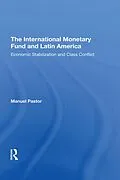The debt crisis in Latin America has rekindled debate about the effects of the IMF's stabilization programs in the Third World. Critics contend that these programs have short-run recessionary impacts and damage prospects for long-term growth. In response, Fund economists point to cross-country studies revealing mixed impacts on growth rates coupled with significant success in achieving the IMF's stated goals: current account and balance-of-payments improvements and inflation rate reduction. Dr. Pastor argues that the traditional growth-oriented critique is theoretically misplaced, and he recasts Fund activities in terms of class and income distribution. Applying the methodology of previous Fund studies, he evaluates the effects of IMF programs in eighteen Latin American countries in the pre-crisis period (1965-1981).
Autorentext
Manuel Pastor is professor of Latin American and Latino studies at the University of California-Santa Cruz. An economics Ph.D. from the University of Massachusetts, Amherst, his research on Latin American issues has focused on such issues as distribution and stabilization, the political economy of trade reform, and the dynamics of transition in Cuba, and has been published in journals such as International Organization, World Development, Journal of Development Economics, Journal of Latin American Studies, and Latin American Research Review.
Inhalt
l I WHAT IS THE IMF? 2 I THE IMF AND THE WORLD ECONOMY, 3 I THE EFFECTS OF IMF 'PROGRAMS: ALTERNATIVE MODELS 4 I THE EFFECTS OF IMF PROGRAMS: EMPIRICAL EVIDENCE
